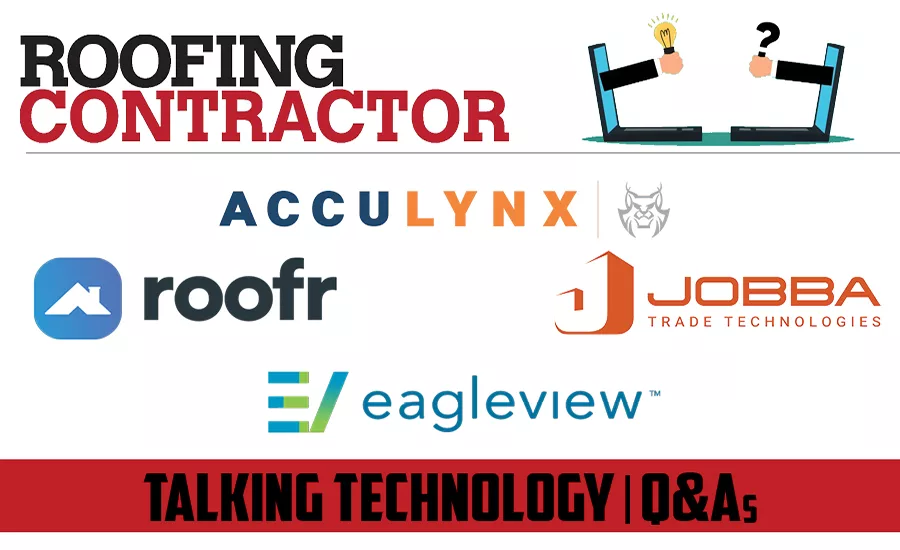RT3 Q&As
Talking Technology: The RC Roundtable
Experts Gear Up for What’s Next as a Tidal Wave of Tech Floods the Roofing Space

Your Expert Panel

Rajiv Jhurani
Senior Vice President of Product, Roofr

Lynn Foster
Director of Operations, AccuLynx

Allan York
Senior VP & GM- Construction & Solar, EagleView Technologies

Scott Keith
Jobba Trade Technologies
The influx of technology entering the roofing industry offers various solutions to real-world problems for contractors with the hope for future growth and sustained success. To maximize it, roofers need to make the right decisions at the right time, which is easier said than done.
RC asked several leaders in the roofing technology space about equipment currently on the market, how it’s helping roofing contractors and what’s trending for the future. Here’s what they had to say.
RC: Describe the current state of the roofing industry and how tech is helping.
RJ: In today's economic climate, homeowners and businesses are understandably more careful about their spending. As a result, roofers need to adjust their business practices to better serve their customers.
It's important for roofers to manage their expenses carefully, including investing in efficient roofing software and making sure they have strong “close” rates. They’ll also need to meet the higher standards that customers now expect when it comes to roof repairs or replacements, specifically by offering fast, digital and modern solutions in this rapidly progressing and competitive industry.
LF: We've seen roofing contractors embracing tech more than ever, with most people using a [Customer Relationship Management] or [Enterprise Resource Planning] system. Contractors have understood the value of [these programs] for a while, but now we’re seeing a lot of point solutions for specialized business functions. [One] problem is that if these systems aren’t integrated or talking to each other, you’ll run into data issues slipping through the cracks.
AY: Technology is helping the industry by aiding forward-thinking roofers to scale their businesses while easing the speed and ease of daily processes. Roofers are building out complete tech stacks to automate outdated manual tasks. And, of course, they’re acquiring remote measurements to create instant quotes and ensure accurate material ordering.
All these tools, especially when integrated, help homogenize the sales process, train employees, and help them adapt to a sales process that produces revenue faster and is easily scaled. The ability to grow a roofing business has never been stronger.
SK: Despite the consistent demand, the roofing industry still faces challenges, such as labor and material shortages. Another big challenge for the industry is the rising costs of building materials. Interestingly, so much technology has flooded the market in such a short amount of time, almost in response to the issues.
As an industry, we need to take the time to understand what each piece of tech does for an individual company, whether it be roofing materials or the business management solutions that help run a company. We [find] that with every new piece of tech created to solve a problem, [a new] problem [arises]: technology not working or talking with one another. The disparate systems [become] actually less efficient — the exact opposite of what technology was supposed to be helping in the first place.
RC: With so many technology choices in the marketplace, how do roofers best assess their return on investment?
RJ: Roofers should audit their entire tech stack to understand where their value is coming from. Are the tools they use affecting key KPIs such as revenue, speed to lead, and close rate? Are the technologies working cohesively together to enable efficient business operations without friction?
By understanding the impact of their technology, roofers can make more informed decisions about which tools to invest in and which ones to let go of.
AY: There are many ways to assess ROI, but some factors that should be considered when evaluating ROI include the number of sales sites per day; closing ratios; accuracy of orders; consistency of margin; employee turnover, and; effectiveness of production crews.
Roofers should also be aware that technology can minimize commission adjustments and significantly impact ROI. The key is never to stop trying to innovate your current process.
SK: I would suggest solving for the big picture, not just buying for one person or department. Often, we see companies with several software solutions that do not complement each other or work together. All these apps add to the complexity but don't produce system-wide benefits, [which] is why the majority of solutions don't reach their potential. When you work with a technology provider, asking and answering questions about your company is critical: What processes are currently working or not? What areas need improvement? What are our company goals?
— ALLAN YORK, EAGLEVIEW TECHNOLOGIES
RC: What areas of tech are growing within the roofing industry?
LF: With all the buzz around ChatGPT and other AI systems, it’s no surprise that I’m going to say ‘AI.’ It’s something new to the roofing industry, and I think there’s a lot of mystery about how it will fit into the way these guys work.
I’m also seeing an increased interest in integrations via APIs. Users want data to be pushed over seamlessly; an API connection allows for that.
AY: Sales companions are the growth leaders in roofing! Using tech to create quotes and automated customer presentations is growing every day. All of this influences the ability to complete a virtual sale, which keeps sales off the road and the roof to complete quotes.
Until recently, drones have been used mostly for marketing in the roofing industry; with the recent addition of autonomous flight and machine learning damage assessment, the use cases are skyrocketing and changing the industry.
SK: In recent years, the marketplace has shifted toward tools that require fewer in-person touchpoints. This [shift] is clear in the widespread adoption … of digital roof measurement and proposals. These tools enable roofers to streamline sales and provide consumers with the fast, digitized experience they desire.
RC: Where can technology make the most significant impact in roofing?
RJ: Helping roofers win more business while providing a delightful customer experience is where we see most innovation happening. For example, offering instant estimates via your website, social media, or even door hangers can improve business awareness, generating new, warm leads. Building job-winning proposals that live natively in your CRM can improve close rates and operational efficiencies.
LF: The biggest impact I see is from the front of the house with the customers’ experience. There’s so much competition nowadays, so how do you differentiate yourself from your competitors? An easy answer for roofing contractors is [through the] customer "experience," and tech can help with that. Things like a customer portal, digital presentation tools, texting, financing, and online payments are easy ways for roofers to better serve their customers without adding extra work to their plates.
AY: Tech should be emphasized in all areas of roofing; using the right tech allows contractors to automate business practices, give real-time updates to customers, create material orders, and so much more. What we don’t talk about enough in the industry is how technology aids safety. Contractors can keep their employees safe by eliminating site visits, keeping an employee off the road and eliminating roof climbs.
SK: Technology can enhance business management and communication processes in roofing projects. The right technology that includes analytics will help you make timely, informed decisions, affecting your bottom line and ROI.
We need to make sure the data is standardized and related to all applications a company is using to make sure the end-to-end results are delivering great benefits.
— SCOTT KEITH, JOBBA TRADE TECHNOLOGIES
RC: Roofers will regret not doing ......... right now regarding technology.
RJ: If you have a roofing company and you're not using a platform made just for roofing businesses, it's a good idea to start now. If you're already using technology, choose a software that's a top choice in the industry and will give you the most benefits based on your goals and challenges to help you succeed in your business.
LF: Embracing it. Technology is here to help; to simplify your life so you can focus on those typical daily tasks that a CRM or business management system can’t do. I think something contractors often get wrong is that they don’t take the time to set up their technology correctly from the start.
AY: Companies that quickly started adopting multiple technologies, growing from one application to 20 or more, spend too much [time] managing every application, resulting in a mess of manual workflows between these apps.
SK: The two biggest regrets roofers will experience a few years from now are avoiding all technology and adopting too many applications. If roofers avoid all technology, they will work twice as hard to manage their business and meet property manager KPIs as peers of similar size, especially as subcontracting grows.
RC: What does the roofing tech landscape look like in five-to-10 years? Will we recognize the industry?
RJ: We believe consumers will expect a digitized, world-class experience throughout roof replacement process. From the moment they interact with the roofer's website to the final payment, they will want to be kept informed and execute everything digitally throughout the project, ensuring their home is protected with a well-built roof.
LF: I’ve been in this space for 12 years, and there are many changes I never predicted would happen. We’ll continue to see AI insert itself more into our space, though I don’t know to what extent. I also think we’ll see some consolidation in the tech space. There are a lot of solutions available, and not all of them are going to last. I think we’ll see that more comprehensive solutions will stick around.
AY: The heart of the industry will always be the physical work of installing and replacing roofs; this will always be recognizable. Tech isn’t going to change that, but tech will continue to change things rapidly, and the tech itself will continue to change.
There will continue to be more providers of technology in the future. Technology companies will continue to work together, and those that continue to work together will flourish; the companies that choose to isolate themselves from other technology companies will fade away.
SK: The roofing tech landscape will be unrecognizable. Some advances in the next five to 10 years could include sustainable and energy-efficient roofing, advancements in “smart” roofing systems, augmented and virtual reality, enhanced safety measures, and digitalization and collaboration.
These advances that once seemed “new” or “different” will soon be more on trend and the norm within the roofing industry. We may not know exactly what to expect, but we are excited to see the roofing industry embrace technology and become more efficient than ever.
Read the full interviews with each expert:
Looking for a reprint of this article?
From high-res PDFs to custom plaques, order your copy today!









